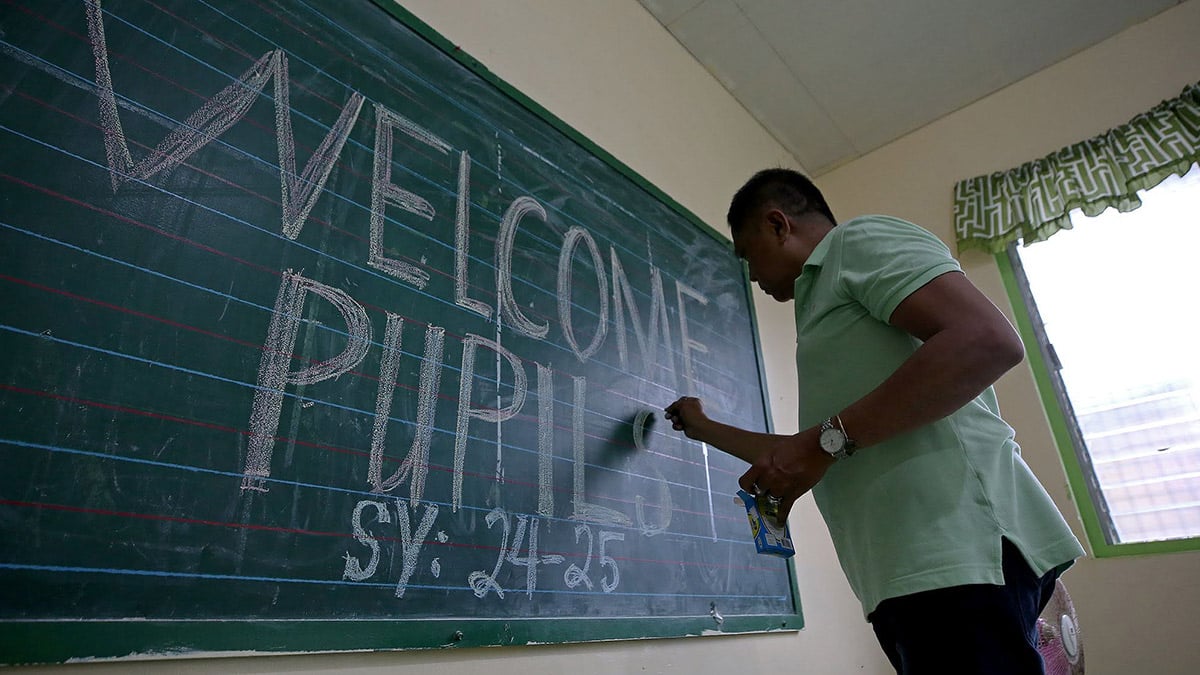
GOING AHEAD WITH CLASS OPENING Teacher Leo Chavit writes a note of welcome for his pupils at Wakas Elementary School in Kawit, Cavite. The school opens on Monday despite being flooded last week amid the impact of Supertyphoon Carina. —Richard A. Reyes
MANILA, Philippines — A day before the start of classes on Monday, the Department of Education (DepEd) said 832 public schools in areas affected by the impact last week of Supertyphoon Carina (international name: Gaemi) have decided to postpone their opening to allow the rehabilitation and cleanup of affected facilities.
A list provided on Sunday by Education Secretary Juan Edgardo Angara, which was later updated on Sunday night, showed that of these schools, the majority, or 452 were in Central Luzon, followed by the Ilocos region with 85. Next were the National Capital Region (NCR) with 225, Calabarzon (Cavite, Laguna, Batangas, Rizal and Quezon provinces) with 66, and Soccsksargen (South Cotabato, Cotabato, Sultan Kudarat, Sarangani and General Santos) with four.
READ: Marcos: ‘Do everything’ to open classes July 29
The figures were higher than the 738 schools nationwide, which the DepEd said last week would not be able to reopen on Monday. Of that total, 442 schools were in Central Luzon, 206 in the NCR, 86 in the Cordillera Administrative Region, and four in Cotabato.
“Most [of these] schools incurred damage in school infrastructures and experienced flooding [and] they will undergo cleanup, especially in Metro Manila,” Angara told the Inquirer in a message.
He added that 149 of the 979 schools were still being used as evacuation centers, although he did not say where these schools were located.
In Metro Manila, all schools in the cities of Marikina, Malabon, Pasig and Valenzuela have decided to postpone the opening of classes, in addition to 15 schools in Quezon City, 13 in San Juan, five in Manila and two in Navotas.
The postponement ranged from as short as a day to as long as a week.
President’s order
A state of calamity was declared in the NCR after heavy rains due to Carina and the enhanced southwest monsoon (“habagat”) left many areas inundated in floodwaters.
Despite this, President Ferdinand Marcos Jr. ordered the DepEd on Friday to “do everything” it can to push through with the school opening, even if teachers must meet their students outside classrooms.
The opening of classes for the school year 2024–2025 was moved back from August to July in preparation for the return to the old academic calendar when schools would open in June and close in March.
A group of teachers, however, called on DepEd and local government officials to “accurately assess the situation” on the ground before Monday’s school opening.
According to Benjo Basas, Teachers’ Dignity Coalition chair, there are still some schools in Metro Manila that are set to open tomorrow, several of these in cities near the Tullahan River which were also affected by the storm.
“Just think that the Tullahan River flows through Caloocan, Malabon, Navotas and Valenzuela and who knows what effects the typhoon had over these areas,” Basas told the Inquirer.
He lamented that only two schools in Navotas had postponed the opening of classes, considering how Typhoon Carina “severely affected the city.”
“Schools were indeed affected but what we are asking here is for the DepEd and our local officials to also consider the situation of students, teachers and parents,” Basas said.
“Imagine if their families were affected by the typhoon, like their houses were destroyed by the typhoon, would you let them go to school considering that kind of situation?” he added.
LTO assistance
In line with Transportation Secretary Jaime Bautista’s order to ensure the safety of all road users for the resumption of classes, Land Transportation Office (LTO) chief Vigor Mendoza II ordered all regional directors and district office heads nationwide to coordinate with their respective local government units (LGUs).
“Your LTO, through our personnel on the ground, will assist in the smooth flow of traffic and ensure compliance of motorists [with] courtesy and discipline on the road,” Mendoza said in a statement on Sunday.
“My instruction is to coordinate with the LGUs for traffic management and what assistance the LTO could provide to ensure the safety of the students, teachers and school personnel, and all road users,” he added.
Mendoza also directed LTO personnel to check the motor vehicles used for school services in coordination with the Land Transportation Franchising and Regulatory Board for roadworthiness.
He said LTO personnel should also be on the lookout for tricycles and other motor vehicles that ferry too many students. “We also have to check on motor vehicles overloaded with students because that is very risky and leads to road accidents.” —with a report from Dexter Cabalza